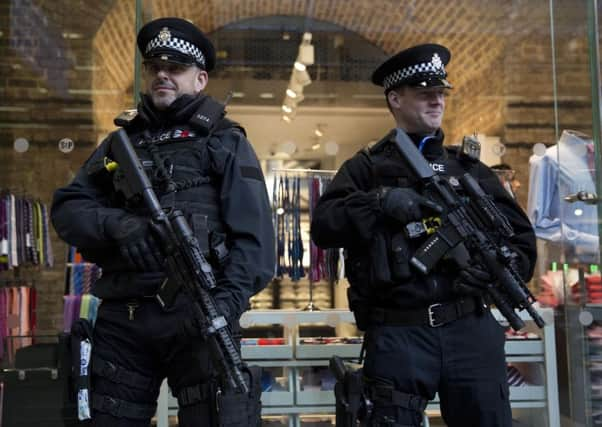Leaders: Security concerns should not lead directly to Brexit


It was always a concern that the European Union referendum would be dominated by security issues. The alliance of nations is about much more than that, and to focus on security is to forget that this is an economic union.
Yes, there are issues over border control and the movement of people which concern security. Sadly, the events in Brussels this week mean it is inevitable that security is going to play highly in this decision.
Advertisement
Hide AdAdvertisement
Hide AdIt’s the first time we have made a decision about whether the EU is good for us or not in 40 years, and when the question finally comes along it is unfortunate that such a momentous decision will be disproportionately influenced by the joint phenomenon of the migrant crisis and the opportunity that gives for Islamic State to attack.
Former Secret Intelligence Service chief Sir Richard Dearlove said he believes that getting out of the EU’s free movement rules could boost Britain’s security.
He believes the other countries in the EU bloc leak information, don’t keep a proper check on their borders, and they have no intelligence to offer. He thinks we can do this better on our own.
However, part of the problem here is that Sir Richard is talking about Britain. We could protect our little island – fortunate as we are not to have a land border with mainland Europe – by ending agreements with other EU countries and doing it our way.
What this neglects to acknowledge is the fact we are fighting global terrorism – and doing so on a scale that none of us could ever actually imagine. To pull up the drawbridge is to turn our back on the way that the conflict affects others; a battle which we stand more chance of winning if we act collectively.
Perhaps Sir Richard just doesn’t like Europe full stop. It would seem so – because the European Convention of Human Rights is also in his sights. Whatever his motivation, he knows security is a more emotive issue than it has been for some time, and there will be those who agree with him.
But it would be wrong to go down the road he is suggesting. Britain is as much a target as France or Belgium.
Terrorists see western civilisations as targets, and Britain will remain in their sights whether we are in or out of the EU.
Advertisement
Hide AdAdvertisement
Hide AdWhat do we do if, at this time of such a big decision over the UK’s future, we allow security concerns to tip us into Brexit … and then the terrorists strike regardless?
The fact is that now, even as a member of the EU, people need a passport to cross our borders. It is hard to see how that would be made any stricter if we were not a member of the EU. But what we know for sure is that if we move away from Europe, then relationships with the other countries will begin to diminish, the day-to-day sharing will slow down and despite the best intentions mistrust might creep in.
That can only mean a diminution of our anti-terrorism intelligence and mean that our country will not be as protected as it is now, and could continue to be.
Steely determination to save jobs
While there are doubts over the viability of the steel industry any deal that has the chance to save jobs is good news.
International metals firm Liberty House has signed a deal to buy two mothballed steel plants in Lanarkshire. It says it can make a success by using a different business model.
The firm sees an opportunity – and if it is a success, then the local workforce will benefit along with the wider economy.
Time will tell, but we wish them luck.
The Scottish Government had announced a cut in business rates at the plants from April for any new operator, provided they continue to use the sites for steel production.
However, this new agreement goes further than that – it involves the Scottish Government buying the plants from Tata Steel, and immediately selling them on to Liberty.
Advertisement
Hide AdAdvertisement
Hide AdMinisters say the sale will be made under the same terms with no cost to the taxpayer – but the Scottish Government’s direct intervention is controversial, given that the forecasts for the steel industry are not encouraging.
Is this a wise move, or will we look back in the long term and say that the deal was strong on sentiment but weak on hard-nosed economics? It should be noted, however, that the local Labour MSP has praised the Scottish Government for stepping in. And at a time when tit-for-tat attacks between opposition party politicians have never been more frequent, that is refreshing.
So on this occasion, the Scottish Government appears to have done the right thing.
Can they now make some long-awaited headway with their other significant intervention in the country, such as attracting new aviation business to Prestwick Airport?